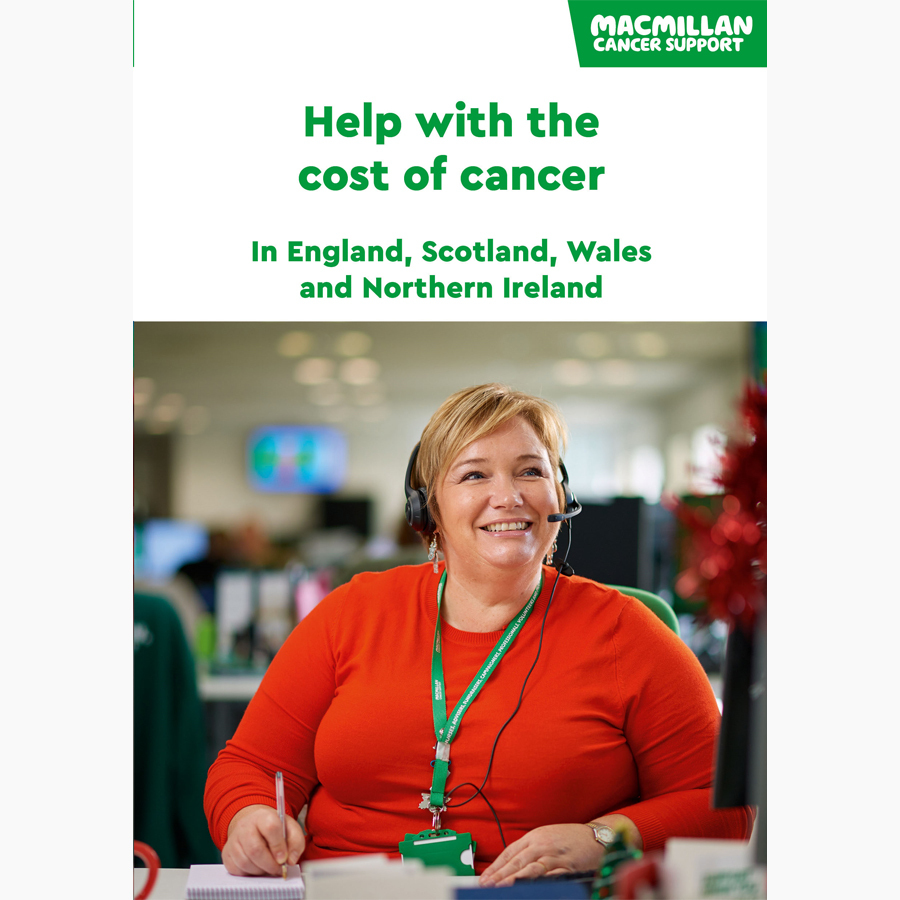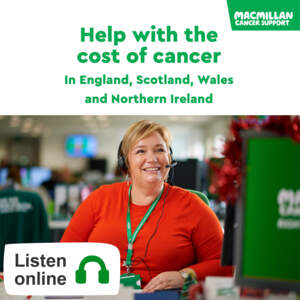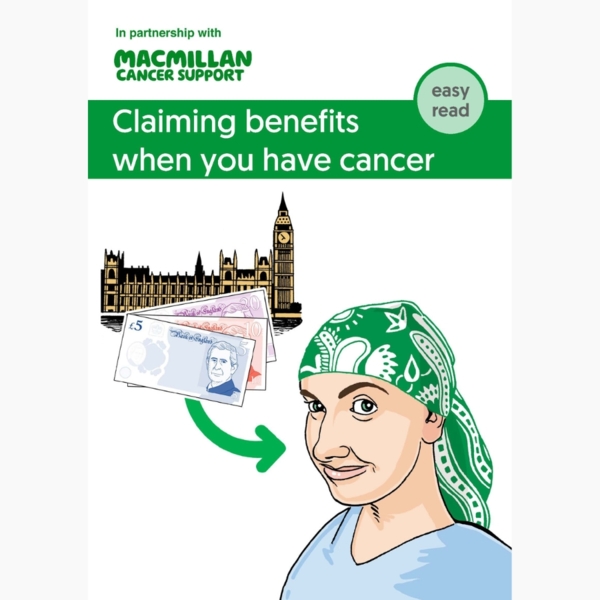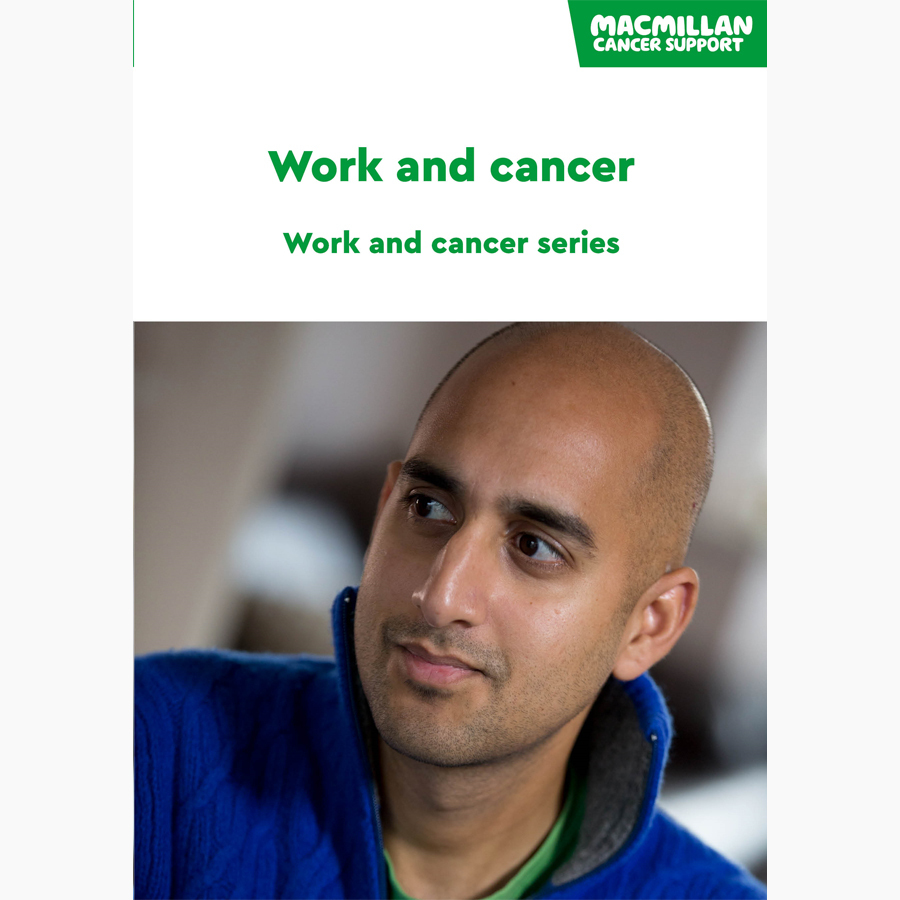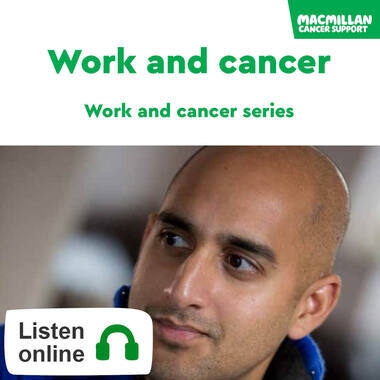Benefits and financial support
You may be able to claim benefits to help you in your situation. You may also be able to get financial assistance from other organisations.
On this page
-
Cancer and financial help
-
Understanding benefits
-
Benefits if you are unable to work or on a low income
-
Disability benefits
-
Benefits for people of pension age
-
Help with children’s costs
-
Help with bills and housing costs
-
Help with health costs
-
Help with transport and parking
-
Benefits at end of life
-
If you look after someone with cancer
-
Glossary
-
Get this information in another language or format
-
About our information
-
Our Pay PIP Now campaign
-
How we can help
Cancer and financial help
A cancer diagnosis can change your financial situation. It may mean you need to stop working, or work less. It can also mean spending more money on things like hospital parking. But depending on your situation, you may be able to get benefits or other financial support.
Understanding benefits
Benefits are payments from the government to people who need financial help. When you are affected by cancer, you may be able to get benefits to:
- help with extra costs
- support you if you need to stop working.
The benefits system can be hard to understand. We have information to help you get the support you need.
Booklets and resources
Benefits if you are unable to work or on a low income
Support from your work
If you work for an employer and take time off sick, you may be able to get sick pay. Your employer should try to support you at work. They should make reasonable adjustments to help you do your job during and after cancer treatment.
You may need help at work even after your employer has made reasonable adjustments. If you do, you can contact a government programme called Access to Work. It provides advice and practical support if you have a long-term health condition that affects the way you do your job.
You will be offered support based on your needs. This may include a grant to help cover the costs of practical support in the workplace. Visit Access to Work, or nidirect if you live in Northern Ireland.
If you are self-employed, you will not get sick pay. But you can still apply for other benefits if you cannot work or your income decreases.
Related pages
Booklets and resources
Employment and Support Allowance
Employment and Support Allowance (ESA) is for people under the State Pension age who have an illness or disability that affects how much they can work. You can apply for ESA if you are:
- employed
- self-employed
- unemployed
- a student.
There are different types of ESA, so it is a good idea to speak to a welfare rights adviser to see if you can make a claim.
Related pages
Universal Credit
Universal Credit (UC) is a benefit for people under State Pension age who are either of the following:
- out of work, for example because of an illness or caring responsibilities
- on a low income.
You may be able to get UC if:
- you are on a low income or out of work
- you are aged 18 or over (or 16 or over in certain cases)
- you are not in full-time education or training (unless exceptions apply, such as you get Personal Independence Payment and cannot work because of ill-health)
- you and your partner have £16,000 or less in savings between you
- you live in the UK.
Jobseeker’s Allowance
Jobseeker’s Allowance (JSA) is for people under State Pension age or who are unemployed, but able to work. It gives you a weekly income while you look for work.
Income tax refund
You may be able to get a tax refund if you give up work, or if your income decreases. It is also worth checking whether you are still paying the correct amount of tax if your situation changes.
Your employer may be able to organise this. You can also apply for a tax refund online or contact HM Revenue and Customs (HMRC) on 0300 200 3300.
Disability benefits
Keeping a diary
- how your condition affects you
- that you have problems looking after yourself.
This may help you complete a claim form for benefits that support people with a disability or illness. You can send your diary as supporting evidence along with your claim form. Other evidence could include reports or care plans from your GP, doctor, nurse or other healthcare professionals.
Personal Independence Payment
Personal Independence Payment (PIP) is a benefit for people aged 16 to State Pension age who live in England, Wales and Northern Ireland. It is for people who have problems with daily living or moving around. You must have had these problems for 3 months and expect them to last for at least 9 months, unless you are terminally ill.
Adult Disability Payment
Adult Disability Payment is a benefit for people over 16 years old and under State Pension age. It is for anyone living in Scotland with a disability or long-term health condition that affects your daily life.
Disability Living Allowance for Adults
Disability Living Allowance (DLA) for adults was a benefit for people aged under 65 who had problems:
- walking
- moving around outdoors safely
- looking after themselves.
DLA for adults has now been replaced by PIP in England, Wales and Northern Ireland and ADP in Scotland. If you live in England, Scotland or Wales and claimed before June 2013, you may still be getting DLA for adults.
Attendance Allowance
Attendance Allowance (AA) is a benefit for people who are at or above State Pension age. It is for people who have problems looking after themselves (personal care needs) because of an illness or disability.
Help with toilet needs
The National Key Scheme (NKS) offers people with a disability, including cancer, access to public disabled toilets across the UK. You can buy a RADAR (Royal Association for Disability and Rehabilitation) from Disability Rights UK or call 0203 687 0790.
In Northern Ireland, you can also buy these keys at any local council office.
The Macmillan toilet card
Cancer treatment can affect the way the bowel or bladder works. Macmillan can send you a free toilet card and key ring. These explain why you may need to access a toilet urgently while out in public. We have a general version, and one for people who are experiencing late side effects after pelvic radiotherapy. Visit Macmillan Orders to order these free resources.
Industrial Injuries Disablement Benefit
You can claim Industrial Injuries Disablement Benefit if you were employed in a job, or on an employment training scheme or course, that caused you to have one of the following:
- a disease
- an accident.
Cancers that can be caused by working in certain jobs include lung cancer and mesothelioma (a type of cancer caused by the material asbestos).
You cannot get this benefit if you were self-employed.
To find out more about Industrial Injuries Disablement Benefit if you live in England, Scotland or Wales, visit GOV.UK. If you live in Northern Ireland, visit nidirect.gov.uk.
How to claim
- If you live in England, Scotland or Wales
You can download an application form at GOV.UK. You can also call the Barnsley Industrial Injuries Disablement Benefit Centre on 0800 121 8379, or use textphone 0800 169 0314 and ask them to send you a form.
- If you live in Northern Ireland
You can download an application form at nidirect.gov.uk. You can also ask your local Social Security or Jobs and Benefits office for a form.
Benefits for people of pension age
State Pension
State Pension is a regular payment you can get from the government when you reach a certain age.
The age you can get State Pension depends on when you were born. The State Pension age for men and women is increasing in stages.
Pension Credit
Pension Credit is a benefit for people who have reached a certain age and have a low income. To get Pension Credit, you and your partner, if you have one, must both have reached State Pension age. Your partner means:
- your husband, wife or civil partner – if you live with them
- someone else you live with as a couple – without being married or in a civil partnership.
Related pages
Help with children’s costs
There is financial assistance available to help with the care and education of children and young people:
- Help from the government towards childcare costs might include a certain amount of free childcare, or some money to help pay for childcare.
- Disability Living Allowance (DLA) for children is a benefit that may help with the extra costs of looking after a child with a disability.
- In Scotland, DLA for children is now the Child Disability Payment.
You may be able to get help with costs for school meals, school clothing and travel. The help you are entitled to will depend on your individual situation and where in the UK you live.
Related pages
Help with bills and housing costs
You may be able to get help with housing costs. This could include rent or mortgage payments, council tax and home adaptations.
Universal Credit and Housing Benefit
Universal Credit (UC) has replaced Housing Benefit in most cases. You may need to apply for UC instead of Housing Benefit if you are making a new claim or there is a change in your circumstances.
Housing Benefit may help with your rent payments if you are unemployed, have a low income or are claiming benefits.
Help with council tax or rates mortgage interest and bills
There are benefits, loans and grants available to help with the costs of housing.
Local council tax reduction schemes can help towards the cost of your council tax if you are on a low income. Council tax reduction schemes are different across the UK.
If you own your home, you may be able to apply for a loan from the government to help towards interest payments on:
- your mortgage
- loans that you have taken out for certain repairs and improvements to your home.
If you need to repair, improve or adapt your home for health reasons, you may be able to get financial help from your local council or the Northern Ireland Housing Executive.
Related pages
Help with health costs
You may be able to get financial help with health costs when you have cancer. This can include help with prescriptions, wigs and fabric supports, dental treatment and eye treatment.
If you need special equipment or aids to help you live at home, you may be able to get what you need for free. Your doctor or nurse may arrange for this to be provided, or they can refer you to a social worker.
If you pay for your own nursing home charges, you may be entitled to financial help. You should speak to your healthcare professional about this..
Help with transport and parking
Travelling for medical appointments can be expensive if you are having regular treatment and tests. You may be able to get help with your travel costs. Or you may be able to claim back some of the money you spend when travelling for medical reasons.
There are services and schemes available if you need help when travelling. Some services are national and will be available to you, while others will be different based on where you live.
If you have problems with moving around, you may be able to get a Blue Badge. This allows you to park in parking spaces closer to where you need to go.
Related pages
Benefits at end of life
If you have found out that your cancer cannot be cured or you are looking after someone with advanced cancer, you may be entitled to benefits or other financial support.
Most people who need care towards the end of their lives qualify for disability benefits. These include:
- Personal Independence Payment (PIP) or Disability Living Allowance (DLA), if aged 16 to State Pension age.
- Attendance Allowance (AA), if at or above State Pension age.
If you are terminally ill, you can apply for some benefits using a fast-track process called special rules. The rules are different depending on where you live in the UK and which benefit you are applying for. You can apply for special rules if your doctor or cancer nurse completes a form saying you have a terminal illness.
Related pages
If you look after someone with cancer
Carer’s Allowance and Carer’s Credit
If you look after someone with a lot of care needs, you could be entitled to Carer’s Allowance. If you are receiving Universal Credit (UC), you might be able to get the carer element, even if you do not qualify for Carer’s Allowance.
If you get Carer’s Allowance, or the carer element of UC, you are not affected by the benefit cap.
Carer’s Credit helps prevent gaps in your National Insurance record if you have to stop working while you are caring for someone else. You need to pay National Insurance to qualify for a State Pension.
Related pages
Bereavement benefits
Bereavement benefits can be paid to someone whose husband, wife or civil partner has died.
If you are making a new claim and your partner died on or after 6 April 2017, you need to apply for Bereavement Support Payment.
To get Bereavement Support Payment, you must have been under State Pension age when your partner died.
Glossary
Useful words to know
When you are dealing with benefits, you may come across lots of new words and not know what they mean.
Some of these words are explained here. If you need more information or support, you can call the Macmillan Support Line free on 0808 808 00 00.
Benefits
Payments from the government to people who need financial help.
Benefit cap
A limit on the total amount of money you can get from a benefit.
Blue Badge
A badge that allows people with mobility problems to park nearer to where they need to go.
Grant
A payment from the government or a charity to help with extra costs such as clothing or heating bills.
Income
All the money you have coming in, for example your wages, benefits or a grant.
Ill-health early retirement
This is where you are allowed to retire and claim your pension early because of your health. If you have, or have had, cancer this may apply to you.
Lump sum
A single, one-off payment, for example from your pension or an insurance scheme.
Mandatory reconsideration
A way to challenge a benefits decision if you disagree with the outcome. This is usually a first step before you can appeal a benefits decision.
Means-tested benefit
A benefit where the amount of money you get depends on your income or savings.
National Insurance
A payment you have to make while working. If you cannot work, you may be able to get National Insurance credits.
Reasonable adjustments
If you are ill, these are changes to your job or workplace that allow you to continue working or return to work.
Special rules
Rules that allow people to get certain benefits more quickly if they are terminally ill.
State Pension
A regular payment you get from the government when you reach a certain age.
Tribunal
A place where benefits appeals are heard and decided.
Workplace pension
A pension arranged through your employer.
Get this information in another language or format
We are committed to making our website as accessible as possible, to make sure that everyone can use it.
We have information about benefits and financial support in over 16 languages, and in other formats including audiobooks, and easy read.
If we don't have what you are looking for, you can ask for information to be translated for free or provided in a format to suit you. Email us at cancerinformationteam@macmillan.org.uk or call us on 0808 808 00 00.
About our information
-
References
Below is a sample of the sources used in our financial help and benefits information. If you would like more information about the sources we use, please contact us at cancerinformationteam@macmillan.org.uk
GOV.UK www.gov.uk (accessed January 2022).
Benefits and pension rates 2021 to 2022. www.gov.uk/government/publications/benefit-and-pension-rates-2021-to-2022/benefit-and-pension-rates-2021-to-2022 (accessed January 2022).
nidirect.gov.uk www.nidirect.gov.uk (accessed January 2022).
-
This information has been written, revised and edited by Macmillan Cancer Support’s Cancer Information Development team. It has been reviewed by Macmillan professionals and people living with cancer. It has been approved by Macmillan’s Welfare Rights team.
Our cancer information has been awarded the PIF TICK. Created by the Patient Information Forum, this quality mark shows we meet PIF’s 10 criteria for trustworthy health information.
Our Pay PIP Now campaign
We campaigned for the UK government to cut long waiting times for Personal Independence Payment (PIP). Over the course of the campaign, average waiting times fell from 20 weeks to 13 weeks.
Date reviewed

Our cancer information meets the PIF TICK quality mark.
This means it is easy to use, up-to-date and based on the latest evidence. Learn more about how we produce our information.
How we can help



